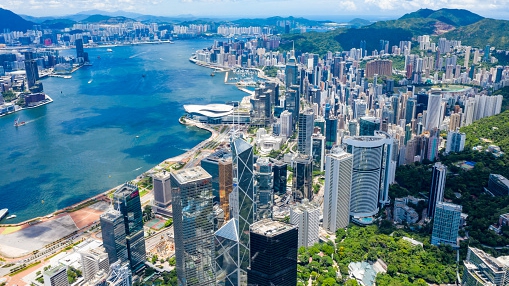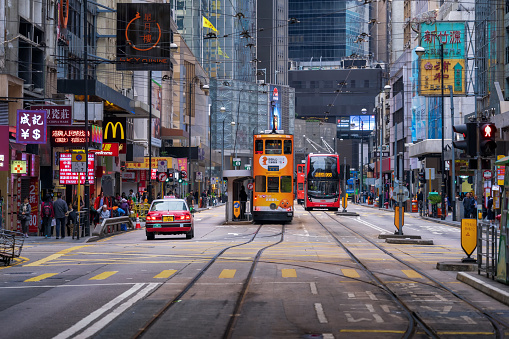
Editor's note: Josef Gregory Mahoney is a professor of politics at East China Normal University. The article reflects the author's opinion, and not necessarily the views of CGTN.
The notion that the Hong Kong Special Administrative Region (HKSAR) is not part of China, that it can chart a course separate from China and even undermine Chinese sovereignty, or that it can do so with guidance and support from foreign countries, is one of the several gross miscalculations that has not only roiled Hong Kong locally, it also has complicated relations between Beijing and a number of capitals around the world.
After years of demonization from the Trump Administration, which took cues in part from Hong Kong activists and vice versa to conflate Hong Kong affairs with developments in China's Xinjiang Uygur Autonomous Region, the South China Sea and the China-India border to fabricate Cold War "anti-communist" propaganda, it has become commonplace in Western media to speak of Beijing's attack on Hong Kong's democracy, its independence, its rule-of-law, par for the course from an "evil regime" guilty of "genocide" and unchecked aggression against its neighbors.
It's quite difficult to sort through this nonsense if you're constantly subjected to inflammatory, anti-China propaganda from Western officials and media – especially if your government is censoring the Chinese media in your country and your own state media, e.g., the BBC, the VOA, and others, advance these lies hand-in-hand with dishonest claims of their own editorial independence from political controls.
No, China isn't committing genocide in Xinjiang – this from the U.S. State Department's own investigation team.
No, China didn't cross the line of control with India, rather, India crossed into China – this according to Indian Prime Minister Narendra Modi.
No, China wasn't the first to militarize the South China Sea – just look at any map of U.S. assets in the area, of advanced U.S. weapons sales in the area, and U.S. military activity stretching back decades and increasing now.
This brings us to Hong Kong. It's quite difficult to write about Hong Kong because doing so can make one appear biased and anti-democratic if not darkly evil. By creating false narratives of genocide and border attacks, by invoking the "red scare" and worse, racially, a "yellow peril," one might well believe Beijing capable of any crime. This of course is one of the objectives that Beijing's enemies have as they try to silence reasonable voices grounded in political reality.

Railway of Hongkong Tramway near the International Finance Center, abbreviated as IFC (branded as "ifc"), a skyscraper and an integrated commercial development of Hong Kong's Central District. /Getty
Railway of Hongkong Tramway near the International Finance Center, abbreviated as IFC (branded as "ifc"), a skyscraper and an integrated commercial development of Hong Kong's Central District. /Getty
But it's also difficult to write about Hong Kong because whatever pain is suffered there, it affects many of us professionally and personally. Anyone who has spent considerable time in East Asia over the decades likely has a deep affection for Hong Kong and wishes above all for peace and prosperity there and throughout the region.
So if bitter medicine is going to be part of the cure, few of us want to speak positively about that, even if it's absolutely true. So it's not just the desire to avoid being slandered as a "puppet or co-conspirator of a genocidal regime" – which is bad enough – none of us feel happy about what's happening in Hong Kong, even if we concur in broad strokes with how the Lam Administration and Beijing have handled matters.
After years of Trump undermining American democracy, culminating in the Capital Invasion and ongoing dangers for more domestic terrorism, with him still giving public speeches attacking U.S. elections, with few Americans trusting their local, state or national governments to ensure basic security and essential needs are met, with entrenched political polarizations and little broad consensus emerging with respect to worsening systemic crises, with ineffective legislative efforts coupled with an intensely politicized judiciary and a presidency ruling by executive order, it's quite possible that Americans in particular no longer have a clear idea what the rule-of-law looks like, or democracy, for that matter.
It shouldn't be surprising that the same clap trappers that pushed America to the brink of ruin applauded rioters in the HKSAR who were doing the same. It also shouldn't be surprising that Beijing has decided to draw a line during the current Two Sessions and address Hong Kong issues more directly. This is what decisive, effective leadership and the rule-of-law looks like: You actually deal with problems legally instead of encouraging reactionary chaos that feeds more of the same.
One of the proposals to be considered involves improving Hong Kong's election rules. The idea is that people committed to undermining Chinese sovereignty cannot be allowed to stand for elections. And let's be very clear – there are several so-called democrats in the HKSAR who completely reject being part of China to the point of personally encouraging and sometimes participating in illegal activities undermining public order.
Another proposal wants to rethink how Hong Kong's tycoons directly impact politics. In fact, the privileged position accorded oligarchs was inherited from British rule over Hong Kong, where an undemocratically appointed "royal governor" ruled in consultation with a star chamber of Hong Kong's richest men. Pushing them back, as well as their entrenched economic positions that have run roughshod over Hong Kong working and middle class from the city's beginning, should be embraced as a positive, democratic objective.
And let us point out, all things considered, that Beijing's proposals are rather modest. Let's not forget how the British imposed order following anti-government protests in Hong Kong in the 1960s and 1970s. Let's not forget how the U.S. federal government seized control of Washington, D.C., in the wake of local governance failures in the 1990s. As the long-time D.C. delegate to Congress Eleanor Holmes Norton said at the time, chastising local leaders – you can't cry about losing the right to rule if you have in fact failed to rule. Of course, what Beijing proposes doesn't come close to that, although you wouldn't know it or the historical contexts from Western sources.
One of the key lessons from history is that evil is self-limiting, and so is poor governance. If the people of Hong Kong need optimism about their future, they can trust this lesson is understood in Beijing better than many capitals. Hopefully those opposed to Hong Kong's growth and development will learn and practice this truism as well, and sooner rather than later.
And hopefully, these new policies will provide a threshold for improved stability, empowering efforts to address the many real concerns that have fed popular unrest, e.g., that we'll see reinvigorated efforts to get housing and living costs under control, along with longstanding but unfilled works associated with larger projects like land reclamation. If so, Hong Kong will again be a great place to live and visit, one that we embrace again without fear of being maligned for doing so.
(If you want to contribute and have specific expertise, please contact us at opinions@cgtn.com.)

